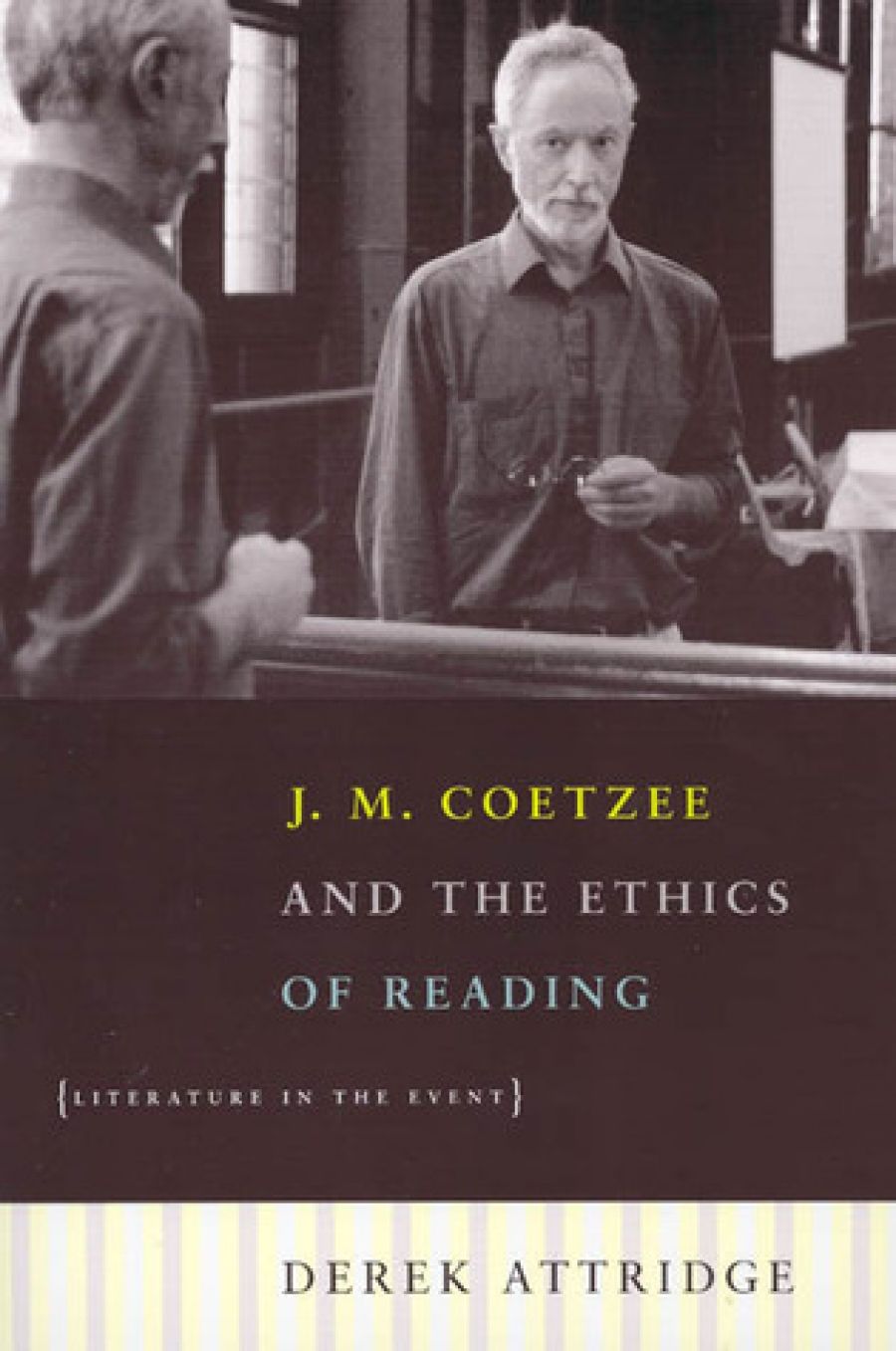
- Free Article: No
- Contents Category: Literary Studies
- Review Article: Yes
- Online Only: No
- Custom Highlight Text:
J.M. Coetzee and the Ethics Of Reading is both a deeply scholarly response to the work of a brilliant and challenging writer, and an act of advocacy for a particular mode of reading, which Derek Attridge characterises variously as ethical, literary, ‘attentive’ and scrupulously responsive to the text. This mode draws on practices of ‘close reading’, while proposing the ethics of ...
- Book 1 Title: J.M. Coetzee And The Ethics Of Reading
- Book 1 Subtitle: Literature in the event
- Book 1 Biblio: University of Chicago Press, $38.95 pb, 240 pp, 0 226 03117 9
He makes a compelling case for what he calls a ‘modernism after modernism’ available to writers from colonial and decolonising cultures as a possible means of enquiry into, and apprehension of, otherness in and through the resources of a self-reflexive literariness. The other, including the ‘verbal artifact that estranges as it entices’, tests us as ‘ethical beings’, demanding of us ‘impulses and acts of respect, of love, of trust, of generosity’. Coetzee, he argues, ‘extends and revitalises modernist practices, and in so doing develops a mode of writing that allows the attentive reader to live through the pressures and possibilities, and also the limits, of political engagement’. For Attridge ‘there is also a sense in which the formally innovative text, the one that estranges itself most from the reader, makes the strongest ethical demand’, although, in a footnote on the same page, he concedes: ‘It could even be said that the realist work is more, not less, demanding than the modernist work, in that the otherness is often disguised, and requires an even more scrupulous responsiveness on the part of the reader.’ The questions posed in the footnote are not taken up in the larger argument. The book is haunted by binaries, explicit (here modernism/realism) and implicit, which need further unpacking.
Attridge’s theoretical propositions are supported by a series of rich, measured, finely nuanced and more accessible readings of Coetzee’s fiction. He has the gift of drawing attention to what we do when we make sense of what we read, how a text might both invite us to make particular interpretative moves and resist those moves, to what is involved and what is at stake in our readings of a text. His chapter ‘Against Allegory: Waiting for the Barbarians and Life & Times of Michael K’, for instance, points to the ways in which Coetzee’s novels ‘seem half to solicit’ readings as allegories, to mobilise what has become a will and willingness to allegorise in both popular and more theoretically arcane criticism. Attridge works then to show the reductiveness of such readings, their seductive appeal in making too familiar the complexities and strangeness of ‘puzzling’ texts, their closing off of the richness and emotiveness of our responses to the literary in what we read.
Each chapter of J.M. Coetzee and the Ethics of Reading addresses a set of issues raised by particular novels or pairs of novels, an approach which thematises the singularity of his response to them. The versatile erudition this approach demands is exacting. His analyses of The Master of Petersburg (1994), with reference to Jacques Derrida’s concept of the arrivant, and of the modalities of ‘confession effect’ in Boyhood: A Memoir (1998) and Youth (2002) are extraordinary.
What remains undertheorised in Attridge’s account of Coetzee’s novels are the inhabitability and seductions of the ethical spaces opened by the kinds of theoretical, literary and philosophical questions into which Coetzee’s fiction and his identifications with Coetzee draw him. The inhabitability is grounded in part by a shared cultural capital acquired through a liberal education. Attridge acknowledges that part of his pleasure in reading Coetzee is in being a white South African of a similar generation, journeying into otherness with Coetzee and into the textual otherness of his writing.
Attridge draws attention to the particular pressures on the South African writer and critic in the historical moment of apartheid and the upheavals, political and moral, of its dismantling. The moment is characterised by a ‘demand that the production and judgment of art be governed by its immediate effectiveness in the struggle for change (or occasionally in the resistance to change) … [which] gave rise to a suspicion of anything appearing hermetic, self-referential, formally inventive, or otherwise distant from the canons and procedures of the realist tradition’. Attridge acknowledges the racialisation of a modernist/realist divide in South African literature. An implicit binary in Attridge’s text troubles me. His own reading practice is positioned as ethical, implicitly as against the utilitarian. Modernism in Attridge’s argument foregrounds its textual otherness; realism often disguises its otherness. In resituating modernism in anti-colonial and decolonising resistances to modernism, the enabling effects of realist strategies in registering otherness for different readerships demand a fuller attention than a passing nod in a footnote, a fuller recognition of their textual ethics and inventive complexities.


Comments powered by CComment